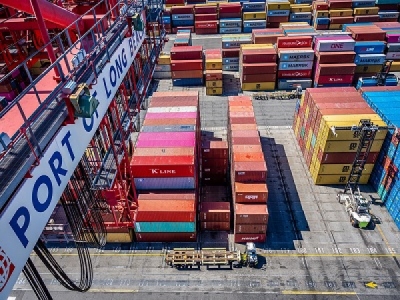
Posted on August 20, 2020
The two busiest U.S. container ports, the Port of Long Beach and Port of Los Angeles, experienced a major rebound in July posting a significant increase in handled cargo, which has been on the decline for months due to the impact of the coronavirus pandemic.
Terminal operators and dockworkers at the Port of Long Beach moved 753,081 cargo container units, recording the busiest month in the 109-year history and topping the record from two years ago.
Trade increased by 21.1% in July compared to the same month in 2019. The previous single-month record of 752,188 twenty-foot-equivalent units (TEUs), set in June 2018, was surpassed by nearly 900 TEUs.
“Supply chain workers at the Port of Long Beach expertly handled a welcome surge in cargo that was brought on due to pent-up demand by consumers,” said Mario Cordero, Executive Director of the Port of Long Beach.
“It was a good month, a bright spot, in the midst of the devastating effects of the coronavirus on the economy.”
Cargo volumes were bolstered in July by a surge in online spending as consumers continued to avoid leaving home during the COVID-19 pandemic. Additionally, the port saw a short-term increase in extra vessel visits to compensate for voyages that were canceled earlier this year.
Imports climbed by 20.3% to 376,807 TEUs, while exports grew by 24.1% to 138,602 TEUs. Empty containers headed back overseas increased 20.8% to 237,672 TEUs.
The port has moved 4,186,115 TEUs during the first seven months of 2020, 2.8% down from the same period in 2019.
The Port of Los Angeles moved 856,389 TEUs in July, the busiest month thus far of 2020. It was also the second-best July in the port’s history, trailing July 2019 by 6.1%.
“Fewer canceled sailings and 11 additional ‘ad hoc’ or unscheduled ship calls helped drive both imports and exports higher than recent months but still short of last July’s all-time record,” said Port of Los Angeles Executive Director Gene Seroka.
“Preliminary data for August indicates solid volumes as retailers continue restocking inventories and preparing for the year-end holiday season.”
July loaded imports decreased by 4.3% to 456,029 TEUs compared to the previous year. Loaded exports dropped by 21.7% to 126,354 TEUs. Empty containers declined by 0.1% to 274,007 TEUs. In total, July volumes totaled 856,389 TEUs.
Seven months into 2020, overall volumes are 4,618,278, a decline of 15.3% compared to 2019.
Source: Offshore Energy





